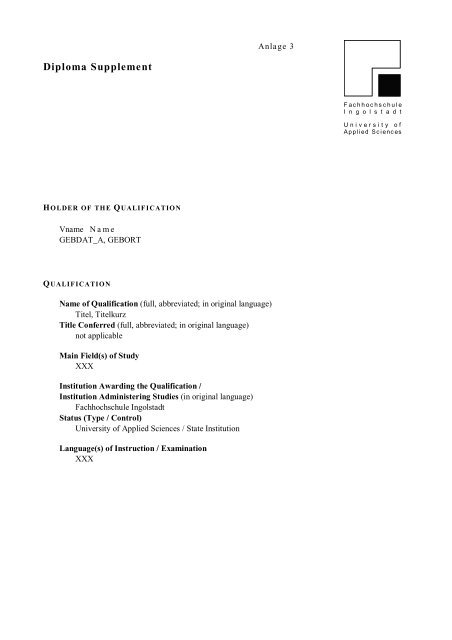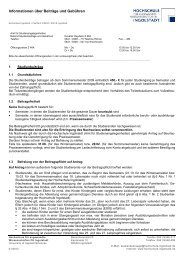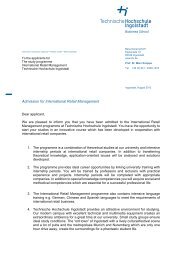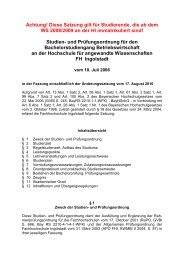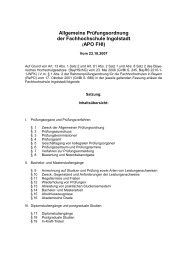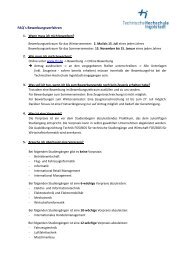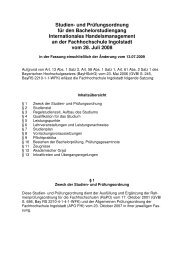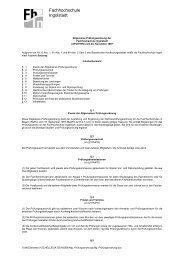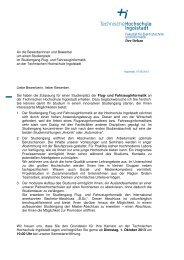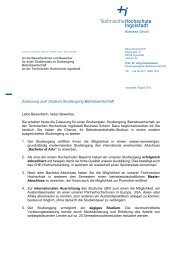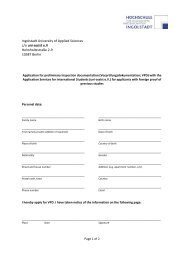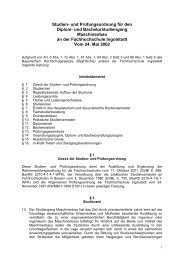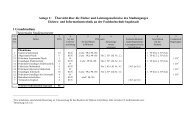Diploma Supplement
Diploma Supplement
Diploma Supplement
You also want an ePaper? Increase the reach of your titles
YUMPU automatically turns print PDFs into web optimized ePapers that Google loves.
Anlage 3<strong>Diploma</strong> <strong>Supplement</strong>FachhochschuleI n g o l s t a d tUniversity ofApplied SciencesHOLDER OF THE QUALIFICATIONVname N a m eGEBDAT_A, GEBORTQUALIFICATIONName of Qualification (full, abbreviated; in original language)Titel, TitelkurzTitle Conferred (full, abbreviated; in original language)not applicableMain Field(s) of StudyXXXInstitution Awarding the Qualification /Institution Administering Studies (in original language)Fachhochschule IngolstadtStatus (Type / Control)University of Applied Sciences / State InstitutionLanguage(s) of Instruction / ExaminationXXX
LEVEL OF THE QUALIFICATIONLevelXXXOfficial Length of ProgrammeXXXAccess RequirementsXXX.CONTENTS AND RESULTS GAINEDMode of StudyXXXProgramme Requirements- XXXProgramme DetailsXXXGrading Schememit Auszeichnung (1,0 - 1,2) = excellentsehr gut (1,3 - 1,5) = very goodgut(1,6 - 2,5) = goodbefriedigend (2,6 - 3,5) = satisfactoryausreichend (3,6 - 4,0) = sufficientnicht ausreichend(5,0) = non sufficient / failOverall Classification (in original language)TEXTNOTEcf. XXXprüfungszeugnis XXX
FUNCTION OF THE QUALIFICATIONAccess to Further StudiesXXX.Professional StatusXXX.ADDITIONAL INFORMATIONAdditional InformationXXXFurther Information SourcesOn the institution and on the program: www.fh-ingolstadt.deCERTIFICATIONThis <strong>Diploma</strong> <strong>Supplement</strong> refers to the following documents:XXXurkundeDATUM_FXXXprüfungszeugnisDATUM_F_2Certification Date:DATUM_F_3VORSITZChairmanExamination Committee(Official Stamp / Seal)NATIONAL HIGHER EDUCATION SYSTEMThe information on the national higher education system on the following pages provides a context for thequalification and the type of higher education that awarded it.
INFORMATION ON THE GERMAN HIGHEREDUCATION SYSTEM 1Types of Institutions and Institutional StatusHigher education (HE) studies in Germany are offered at three types of HigherEducation Institutions (HEI). 2- Universitäten (Universities) including various specialized institutions, offerthe whole range of academic disciplines. In the German tradition,universities focus in particular on basic research so that advanced stagesof study have mainly theoretical orientation and research-orientedcomponents.- Fachhochschulen (Universities of Applied Sciences) concentrate theirstudy programmes in engineering and other technical disciplines,business-related studies, social work, and design areas. The commonmission of applied research and development implies a distinctapplication-oriented focus and professional character of studies, whichinclude integrated and supervised work assignments in industry,enterprises or other relevant institutions.- Kunst- und Musikhochschulen (Universities of Art/Music) offer studies forartistic careers in fine arts, performing arts and music; in such fields asdirecting, production, writing in theatre, film, and other media; and in avariety of design areas, architecture, media and communication.Higher Education Institutions are either state or state-recognized institutions.In their operations, including the organization of studies and the designationand award of degrees, they are both subject to higher education legislation.Types of Programmes and Degrees AwardedStudies in all three types of institutions have traditionally been offered inintegrated "long" (one-tier) programmes leading to Diplom- or Magister Artiumdegrees or completed by a Staatsprüfung (State Examination).Within the framework of the Bologna-Process one-tier study programmes aresuccessively being replaced by a two-tier study system. Since 1998, a schemeof first- and second-level degree programmes (Bachelor and Master) wasintroduced to be offered parallel to or instead of integrated "long" programmes.These programmes are designed to provide enlarged variety and flexibility tostudents in planning and pursuing educational objectives, they also enhanceinternational compatibility of studies.Table 1 provides a synoptic summary.Approval/Accreditation of Programmes and DegreesTo ensure quality and comparability of qualifications, the organization ofstudies and general degree requirements have to conform to principles andregulations established by the Standing Conference of the Ministers ofEducation and Cultural Affairs of the Länder in the Federal Republic ofGermany (KMK). 3 In 1999, a system of accreditation for programmes of studyhas become operational under the control of an Accreditation Council atnational level. All new programmes have to be accredited under this scheme;after a successful accreditation they receive the quality-label of theAccreditation Council. 4Table 1: Institutions, Programmes and Degrees in German Higher Education
Organization and Structure of StudiesThe following programmes apply to all three types of institutions.Bachelor's and Master's study courses may be studied consecutively, atvarious higher education institutions, at different types of highereducation institutions and with phases of professional work between thefirst and the second qualification. The organization of the studyprogrammes makes use of modular components and of the EuropeanCredit Transfer and Accumulation System (ECTS) with 30 creditscorresponding to one semester.BachelorBachelor degree study programmes lay the academic foundations,provide methodological skills and lead to qualifications related to theprofessional field. The Bachelor degree is awarded after 3 to 4 years.The Bachelor degree programme includes a thesis requirement. Studycourses leading to the Bachelor degree must be accredited according tothe Law establishing a Foundation for the Accreditation of StudyProgrammes in Germany. 5First degree programmes (Bachelor) lead to Bachelor of Arts (B.A.),Bachelor of Science (B.Sc.), Bachelor of Engineering (B.Eng.),Bachelor of Laws (LL.B.), Bachelor of Fine Arts (B.F.A.) or Bachelor ofMusic (B.Mus.).MasterMaster is the second degree after another 1 to 2 years. Master studyprogrammes must be differentiated by the profile types "more practiceoriented"and "more research-oriented". Higher Education Institutionsdefine the profile of each Master study programme.The Master degree study programme includes a thesis requirement.Study programmes leading to the Master degree must be accreditedaccording to the Law establishing a Foundation for the Accreditation ofStudy Programmes in Germany. 6Second degree programmes (Master) lead to Master of Arts (M.A.),Master of Science (M.Sc.), Master of Engineering (M.Eng.), Master ofLaws (L.L.M), Master of Fine Arts (M.F.A.) or Master of Music (M.Mus.).Master study programmes, which are designed for continuing educationor which do not build on the preceding Bachelor study programmes interms of their content, may carry other designations (e.g. MBA).Integrated "Long" Programmes (One-Tier): Diplom degrees,Magister Artium, StaatsprüfungAn integrated study programme is either mono-disciplinary (Diplomdegrees, most programmes completed by a Staatsprüfung) orcomprises a combination of either two major or one major and twominor fields (Magister Artium). The first stage (1.5 to 2 years) focuseson broad orientations and foundations of the field(s) of study. AnIntermediate Examination (Diplom-Vorprüfung for Diplom degrees;Zwischenprüfung or credit requirements for the Magister Artium) isprerequisite to enter the second stage of advanced studies andspecializations. Degree requirements include submission of a thesis (upto 6 months duration) and comprehensive final written and oralexaminations. Similar regulations apply to studies leading to aStaatsprüfung. The level of qualification is equivalent to the Masterlevel.- Integrated studies at Universitäten (U) last 4 to 5 years (Diplomdegree, Magister Artium) or 3 to 6.5 years (Staatsprüfung). TheDiplom degree is awarded in engineering disciplines, the naturalsciences as well as economics and business. In the humanities,the corresponding degree is usually the Magister Artium (M.A.). Inthe social sciences, the practice varies as a matter of institutionaltraditions. Studies preparing for the legal, medical, pharmaceuticaland teaching professions are completed by a Staatsprüfung.The three qualifications (Diplom, Magister Artium andStaatsprüfung) are academically equivalent. They qualify to applyfor admission to doctoral studies. Further prerequisites foradmission may be defined by the Higher Education Institution.- Integrated studies at Fachhochschulen (FH)/Universities of AppliedSciences (UAS) last 4 years and lead to a Diplom (FH) degree.While the FH/UAS are non-doctorate granting institutions, qualifiedgraduates may apply for admission to doctoral studies atdoctorate-granting institutions.- Studies at Kunst- and Musikhochschulen (Universities of Art/Musicetc.) are more diverse in their organization, depending on the fieldand individual objectives. In addition to Diplom/Magister degrees,the integrated study programme awards include Certificates andcertified examinations for specialized areas and professionalpurposes.institutions regulate entry to a doctorate as well as the structure of theprocedure to determine aptitude. Admission further requires theacceptance of the Dissertation research project by a professor as asupervisor.Grading SchemeThe grading scheme in Germany usually comprises five levels (withnumerical equivalents; intermediate grades may be given): "Sehr Gut"(1) = Very Good; "Gut" (2) = Good; "Befriedigend" (3) = Satisfactory;"Ausreichend" (4) = Sufficient; "Nicht ausreichend" (5) = Non-Sufficient/Fail. The minimum passing grade is "Ausreichend" (4). Verbaldesignations of grades may vary in some cases and for doctoraldegrees.In addition institutions may already use the ECTS grading scheme,which operates with the levels A (best 10 %), B (next 25 %), C (next 30%), D (next 25 %), and E (next 10 %).Access to Higher EducationThe General Higher Education Entrance Qualification (AllgemeineHochschulreife, Abitur) after 12 to 13 years of schooling allows foradmission to all higher educational studies. Specialized variants(Fachgebundende Hochschulreife) allow for admission to particulardisciplines. Access to Fachhochschulen (UAS) is also possible with aFachhochschulreife, which can usually be acquired after 12 years ofschooling. Admission to Universities of Art/Music may be based onother or require additional evidence demonstrating individual aptitude.Higher Education Institutions may in certain cases apply additionaladmission procedures.National Sources of Information- Kultusministerkonferenz (KMK) [Standing Conference of theMinisters of Education and Cultural Affairs of the Länder in theFederal Republic of Germany]; Lennéstrasse 6, D-53113 Bonn; Fax:+49[0]228/501-229; Phone: +49[0]228/501-0- Central Office for Foreign Education (ZaB) as German NARIC;www.kmk.org; E-Mail: zab@kmk.org- “Documentation and Educational Information Service” as GermanEURYDICE-Unit, providing the national dossier on the educationsystem (www.kmk.org/doku/bildungswesen.htm; E-Mail:eurydice@kmk.org)- Hochschulrektorenkonferenz (HRK) [German Rectors' Conference];Ahrstrasse 39, D-53175 Bonn; Fax: +49[0]228/887-110; Phone:+49[0]228/887-0; www.hrk.de; E-Mail: sekr@hrk.de- “Higher Education Compass” of the German Rectors' Conferencefeatures comprehensive information on institutions, programmes ofstudy, etc. (www.higher-education-compass.de)1The information covers only aspects directly relevant to purposes ofthe <strong>Diploma</strong> <strong>Supplement</strong>. All information as of 1 July 2005.2Berufsakademien are not considered as Higher EducationInstitutions, they only exist in some of the Länder. They offereducational programmes in close cooperation with privatecompanies. Students receive a formal degree and carry out anapprenticeship at the company. Some Berufsakademien offerBachelor courses which are recognized as an academic degree ifthey are accredited by a German accreditation agency.3Common structural guidelines of the Länder as set out in Article 9Clause 2 of the Framework Act for Higher Education (HRG) for theaccreditation of Bachelor's and Master's study courses (Resolutionof the Standing Conference of the Ministers of Education andCultural Affairs of the Länder in the Federal Republic of Germany of10.10.2003, as amended on 21.4.2005).4“Law establishing a Foundation 'Foundation for the Accreditation ofStudy Programmes in Germany'”, entered into force as from26.2.2005, GV. NRW. 2005, nr. 5, p. 45 in connection with theDeclaration of the Länder to the Foundation "Foundation:Foundation for the Accreditation of Study Programmes in Germany"(Resolutionof the Standing Conference of the Ministers of Education andCultural Affairs of the Länder in the Federal Republic of Germany of16.12.2004.5See note No. 4.6See note No. 4.DoctorateUniversities as well as specialized institutions of university standing andsome Universities of Art/Music are doctorate-granting institutions.Formal prerequisite for admission to doctoral work is a qualified Master(UAS and U), a Magister degree, a Diplom, a Staatsprüfung, or aforeign equivalent. Particularly qualified holders of a Bachelor or aDiplom (FH) degree may also be admitted to doctoral studies withoutacquisition of a further degree by means of a procedure to determinetheir aptitude. The universities respectively the doctorate-granting


